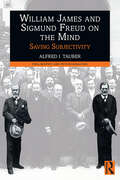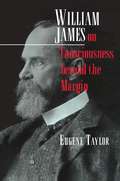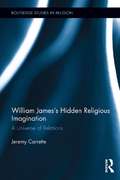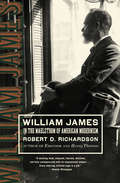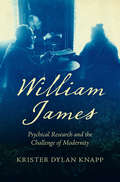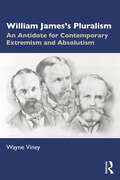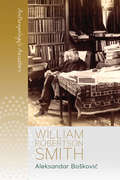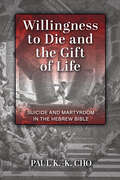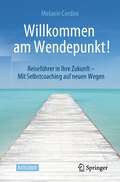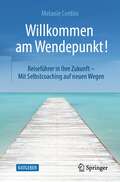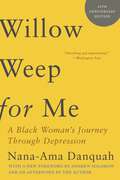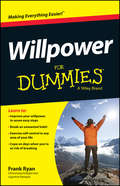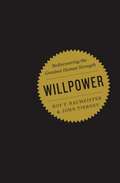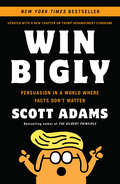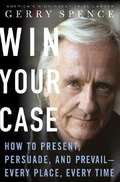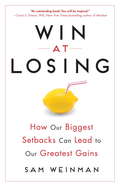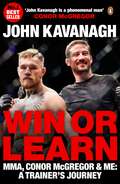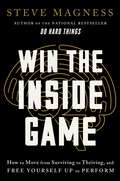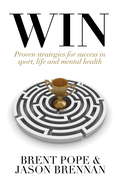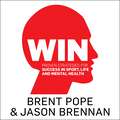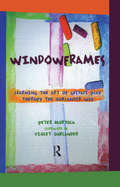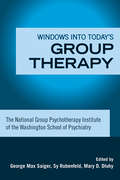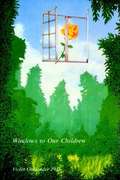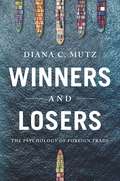- Table View
- List View
William James and Sigmund Freud on the Mind: Saving Subjectivity (Philosophy and Psychoanalysis)
by Alfred I. TauberThis is the first extended study comparing the philosophies of mind promoted by Sigmund Freud and William James, whose opposing views had profound influences on the development of twentieth-century philosophy, cognitive science, and psychology.Each asked, can the mind be scientifically characterized? While Freud thought that psychoanalysis had established a science of the mind, James maintained that the subjective could not be objectified, and psychology was left with only "the crumbs" of analysis. Tauber’s presentation of a conjured philosophical confrontation occasioned by their first and only meeting in 1909 uncovers the clashing philosophies of mind underlying their respective positions. In comparing their opposing portraits of the psyche, persistent questions about self-knowledge, personal identity, and moral agency are presented at their fin de siècle origin. In this setting, the James-Freud dispute offers a unique perspective about our own contemporary dilemmas swirling around selfhood, consciousness, and the subjectivity of human experience.This eclectic history of early psychology will interest psychoanalysts, psychologists, and philosophers as well as those interested in the origins of pragmatism, phenomenology, modernism, and twentieth-century positivism.
William James on Consciousness beyond the Margin
by Eugene TaylorAt the turn of the twentieth century, William James was America's most widely read philosopher. In addition to being one of the founders of pragmatism, however, he was also a leading psychologist and author of the seminal work, The Principles of Psychology (1890). While scholars argue that James withdrew from the study of psychology after 1890, Eugene Taylor demonstrates convincingly that James remained preeminently a psychologist until his death in 1910.Taylor details James's contributions to experimental psychopathology, psychical research, and the psychology of religion. Moreover, Taylor's work shows that out of his scientific study of consciousness, James formulated a sophisticated metaphysics of radical empiricism. In light of historical developments in psychology, as well as the current philosophic implications of the neuroscience revolution related to the biology of consciousness, Taylor argues that both the subject matter of James's investigations and his metaphysics of radical empiricism are just as important for psychology today as James believed they were in his own time.This book represents a major new contribution both to James scholarship and to the history of American psychology. Although philosophers have analyzed radical empiricism, this book is the first to trace the development of radical empiricism as a metaphysics addressed to psychologists. It is also the first to show James's involvement in depth-psychology and psychotherapeutics and to trace historical continuity between James's work on consciousness and subsequent developments in psychoanalysis, personality theory, and humanistic psychology.
William James's Hidden Religious Imagination: A Universe of Relations (Routledge Studies in Religion)
by Jeremy CarretteThis book offers a radical new reading of William James’s work on the idea of ‘religion.’ Moving beyond previous psychological and philosophical interpretations, it uncovers a dynamic, imaginative, and critical use of the category of religion. This work argues that we can only fully understand James’s work on religion by returning to the ground of his metaphysics of relations and by incorporating literary and historical themes. Author Jeremy Carette develops original perspectives on the influence of James’s father and Calvinism, on the place of the body and sex in James, on the significance of George Eliot’s novels, and Herbert Spencer’s ‘unknown,’ revealing a social and political discourse of civil religion and republicanism and a poetic imagination at the heart of James understanding of religion. These diverse themes are brought together through a post-structural sensitivity and a recovery of the importance of the French philosopher Charles Renouvier to James’s work. This study pushes new boundaries in Jamesian scholarship by reading James with pluralism and from the French tradition. It will be a benchmark text in the reshaping of James and the nineteenth-century foundations of the modern study of ‘religion.’
William James, Sciences of Mind, and Anti-Imperial Discourse
by Bernadette M. BakerIn the past few decades, the humanities and social sciences have developed new methods of reorienting their conceptual frameworks in a 'world without frontiers'. In this book, Bernadette M. Baker offers an innovative approach to rethinking sciences of mind as they formed at the turn of the twentieth century, via the concerns that have emerged at the turn of the twenty-first. The less-visited texts of Harvard philosopher and psychologist William James provide a window into contemporary debates over principles of toleration, anti-imperial discourse and the nature of ethics. Baker revisits Jamesian approaches to the formation of scientific objects including the child mind, exceptional mental states and the ghost to explore the possibilities and limits of social scientific thought dedicated to mind development and discipline formation around the construct of the West.
William James: In the Maelstrom of American Modernism
by Robert D. RichardsonThe definitive biography of the fascinating William James, whose life and writing put an indelible stamp on psychology, philosophy, teaching, and religion—on modernism itself. Often cited as the &“father of American psychology,&” William James was an intellectual luminary who made significant contributions to at least five fields: psychology, philosophy, religious studies, teaching, and literature. A member of one of the most unusual and notable of American families, James struggled to achieve greatness amid the brilliance of his theologian father; his brother, the novelist Henry James; and his sister, Alice James. After studying medicine, he ultimately realized that his true interests lay in philosophy and psychology, a choice that guided his storied career at Harvard, where he taught some of America&’s greatest minds. But it is James&’s contributions to intellectual study that reveal the true complexity of man. In this biography that seeks to understand James&’s life through his work—including Principles of Psychology, The Varieties of Religious Experience, and Pragmatism—Robert D. Richardson has crafted an exceptionally insightful work that explores the mind of a genius, resulting in &“a gripping and often inspiring story of intellectual and spiritual adventure&” (Publishers Weekly, starred review). &“A magnificent biography.&” —The Washington Post
William James: Psychical Research and the Challenge of Modernity
by Krister Dylan KnappIn this insightful new book on the remarkable William James, the American psychologist and philosopher, Krister Dylan Knapp provides the first deeply historical and acutely analytical account of James's psychical research. While showing that James always maintained a critical stance toward claims of paranormal phenomena like spiritualism, Knapp uses new sources to argue that psychical research held a strikingly central position in James's life. It was crucial to his familial and professional relationships, the fashioning of his unique intellectual disposition, and the shaping of his core doctrines, especially the will-to-believe, empiricism, fideism, and theories of the subliminal consciousness and immortality.Knapp explains how and why James found in psychical research a way to rethink the well-trodden approaches to classic Euro-American religious thought, typified by the oppositional categories of natural vs. supernatural and normal vs. paranormal. He demonstrates how James eschewed these choices and instead developed a tertiary synthesis of them, an approach Knapp terms tertium quid, the third way. Situating James's psychical research in relation to the rise of experimental psychology and Protestantism's changing place in fin de siecle America, Knapp asserts that the third way illustrated a much broader trend in transatlantic thought as it struggled to navigate the uncertainties and religious adventurism of the modern age.
William James’s Pluralism: An Antidote for Contemporary Extremism and Absolutism
by Wayne VineyWilliam James’s Pluralism: An Antidote for Contemporary Extremism and Absolutism explores extremism and the related problem of absolutism in the context of the psychology and philosophy of William James. Extremist and absolutist views were topical in James’s day, especially around the time of the Civil War, but they are no less common in these early years of the 21st century. James argued that the love of singularities such as belief in one God, one method, one political system, or one value system contributes to extremist, even violent mentalities. In this book, James’s views on singular versus pluralistic perspectives are explored and then applied to contemporary practical issues such as abortion, birth control, and death with dignity legislation. These perspectives are furthermore applied to more theoretical issues, such as causality, values, and methods or ways of investigating the world. Within William James’s Pluralism, these theories are investigated in a comprehensive philosophical and psychological examination of the human experience. Written in a nontechnical manner to appeal to the general public—just as William James hoped for his pluralistic philosophy—this book is additionally of considerable interest to academics and students across many fields such as psychology, philosophy, history, and sociology.
William Robertson Smith (Anthropology's Ancestors #2)
by Aleksandar BoškovićWilliam Robertson Smith’s influence on anthropology ranged from his relationship with John Ferguson McLennan, to advising James George Frazer to write about “Totem” and “Taboo” for the Encyclopaedia Britannica that he edited. This biography places a special emphasis on the notes and observations from his travels to Arabia, as well as on his influence on the representatives of the “Myth and Ritual School.” With his discussion of myth and ritual, Smith influenced generations of scholars, and his insistence on the connection between the people, their God, and the land they inhabited inspired many of the concepts later developed by Émile Durkheim.
Willingness to Die and the Gift of Life: Suicide and Martyrdom in the Hebrew Bible
by Paul K.-K. ChoOne particularly challenging aspect of the Hebrew Bible is its treatment of various forms of voluntary death: suicide, suicide attack, martyrdom, and self-sacrifice. How can people of faith make sense of the ways biblical literature at times valorizes these sensitive and painful topics? Willingness to Die and the Gift of Life surveys a diverse selection of Hebrew Bible narratives that feature characters who express a willingness to die, including Moses, Judah, Samson, Esther, Job, Daniel, and the &“suffering servant&” of Isaiah 53. The challenging truth uncovered is that the Hebrew Bible, while taking seriously the darker aspects of voluntary death, nevertheless time and again valorizes the willingness to die—particularly when it is for the sake of the group or in faithful commitment to God. Many biblical authors go so far as to suggest that death willingly embraced can unlock immense power: endowing the willing with the charism necessary to lead, opening the possibility of salvation, and even paving the way for resurrection into a new, more glorious life. Paul K.-K. Cho&’s unflinching analysis raises and wrestles with provocative questions about religious extremism, violent terrorism, and suicidal ideation —all of which carry significant implications for the biblically grounded life of faith today. Cho carefully situates the surveyed texts in their original cultural context, discussing relevant topics such the shame and honor culture of ancient Israel and the importance attached to the group over the individual. Closing with an epilogue that reflects on the surprising issue of whether biblical authors considered God to be capable of dying or being willing to die, Cho&’s fascinating study showcases the multifaceted relationship between death and life in the Hebrew Bible.
Willkommen am Wendepunkt!: Reiseführer in Ihre Zukunft – Mit Selbstcoaching auf neuen Wegen
by Melanie CordiniDieses Buch ist ein Reiseführer in Ihre Zukunft und zu Ihnen selbst!Wir alle erleben Wendepunkte. Sie sind zeitlos, weil sie zum Leben gehören. Sie sind Weichen, die über unsere Zukunft entscheiden, beruflich und privat. Welche Rolle spielt unser Innenleben am Wendepunkt? Woher kommen Schuld- und Angstgefühle? Welche Rolle spielen soziale Normen, Bauchgefühl, inneres Team und Glaubenssätze?Was lernen wir aus typischen Wendepunkten wie Familiengründung, Ruhestand, Schulabschluss oder privater Trennung? Wie helfen uns Krankheitssymptome glücklicher zu werden? Wie gewinnen wir eine positive Lebenseinstellung?Treffen Sie Ihre Wahl sowohl mit sachlichem Abstand als auch mit emotionaler Tiefe. Befreien Sie sich von unnötigem Ballast auf Ihrem Weg! Hinterfragen Sie Beweggründe und Ziele und finden Sie Ihr individuelles Lösungsmuster. Sie können mehr beeinflussen als Sie glauben!Dieser Ratgeber liefert alle erforderlichen Informationen für Ihre Wendepunkte, sortiert Ihr emotionales Gepäck und gibt unterhaltsam Empfehlungen für die optimale Reiseroute. In vielen Stories und humorvollen Beispielen aus dem Leben der Autorin und ihrer Coaching-Praxis werden Sie sich wiederfinden. Als Proviant für den Weg erhalten Sie zusätzlich den passenden Reise-Soundtrack, Ihr Trainings-Camp mit Praxisübungen sowie den Schnelldurchlauf aller Kapitel in handlichen Reisenotizen.
Willkommen am Wendepunkt!: Reiseführer in Ihre Zukunft – Mit Selbstcoaching auf neuen Wegen
by Melanie CordiniDieses Buch ist ein Reiseführer in Ihre Zukunft und zu Ihnen selbst!Wir alle erleben Wendepunkte. Sie sind zeitlos, weil sie zum Leben gehören. Sie sind Weichen, die über unsere Zukunft entscheiden, beruflich und privat. Welche Rolle spielt unser Innenleben am Wendepunkt? Woher kommen Schuld- und Angstgefühle? Welche Rolle spielen soziale Normen, Bauchgefühl, inneres Team und Glaubenssätze?Was lernen wir aus typischen Wendepunkten wie Familiengründung, Ruhestand, Schulabschluss oder privater Trennung? Wie helfen uns Krankheitssymptome glücklicher zu werden? Wie gewinnen wir eine positive Lebenseinstellung?Treffen Sie Ihre Wahl sowohl mit sachlichem Abstand als auch mit emotionaler Tiefe. Befreien Sie sich von unnötigem Ballast auf Ihrem Weg! Hinterfragen Sie Beweggründe und Ziele und finden Sie Ihr individuelles Lösungsmuster. Sie können mehr beeinflussen als Sie glauben!Dieser Ratgeber liefert alle erforderlichen Informationen für Ihre Wendepunkte, sortiert Ihr emotionales Gepäck und gibt unterhaltsam Empfehlungen für die optimale Reiseroute. In vielen Stories und humorvollen Beispielen aus dem Leben der Autorin und ihrer Coaching-Praxis werden Sie sich wiederfinden. Als Proviant für den Weg erhalten Sie Ihr Trainings-Camp mit Praxisübungen sowie den Schnelldurchlauf aller Kapitel in handlichen Reisenotizen.
Willow Weep for Me: A Black Woman's Journey Through Depression
by Nana-Ama DanquahThe first book to focus on Black women and depression, through the author’s “absorbing and inspirational” (Washington Post) personal journey. When Nana-Ama Danquah, a twenty-two-year-old single mother, began to suffer from a variety of depressive symptoms after giving birth to her daughter, she thought she was going crazy. Determined to portray strength in a world that often undervalues Black women’s lives, she shrouded her debilitating despair in silence and denial. But when she befriends other Black women who suffer with depression, she finds the support she needs to confront the traumatic childhood events that lie beneath her grief. Twenty-five years after its initial publication, as best-selling author Andrew Solomon writes in an illuminating foreword, Willow Weep for Me “remains a brave book . . . but at the time of its writing it was humblingly audacious.” Also including an afterword from the author, this groundbreaking classic is a powerful meditation on courage and a litany for survival. “An important and moving memoir. [Danquah] describes beautifully her experiences with depression.” —Kay Redfield Jamison, author of An Unquiet Mind
Willpower For Dummies
by Frank RyanDevelop rock-solid willpower with evidence-based techniques Willpower For Dummies shows you how to train, strengthen, and improve your willpower in seven easy steps! Written by a clinical psychologist and cognitive therapist, the book proves that willpower can be learned like any other skill, and provides tons of practical exercises and strategies you can start using today. You'll learn how willpower works inside the brain, and how choosing goals and identifying challenges can affect your success. The book stresses the importance of patience, rewards and being kind to yourself, and walks you through the techniques that will keep you on the right track, even on your worst days. The mind works in two different ways: the long view and the short view. Controlling which aspect wins out is the key to willpower. Willpower For Dummies breaks this complex science down into easily digestible bits, written in plain English with a dash of humour. You'll find scientifically robust guidance toward strengthening your willpower just like a muscle, and expert advice on training your brain to work with you instead of against you. Discover the most important factors in building self-discipline Learn how to set goals and how to train your willpower Practice simple willpower-strengthening exercises Employ coping strategies for when you're about to break Whether you're trying to lose weight, quit smoking or just work harder, rest assured that you can do it—regardless of past failures and false starts. Willpower is not a trait, but a skill. Everyone can learn it, and everyone can make it stronger. Willpower For Dummies walks you through the process, teaching you the skills you need for lasting success.
Willpower: Rediscovering the Greatest Human Strength
by John Baumeister Roy F. TierneyCan you resist everything except temptation? In a hedonistic age full of distractions, it's hard to possess willpower - or in fact even understand why we should need it. Yet it's actually the most important factor in achieving success and a happy life, shown to be more significant than money, looks, background or intelligence. This book reveals the secrets of self-control. For years the old-fashioned, even Victorian, value of willpower has been disparaged by psychologists who argued that we're largely driven by unconscious forces beyond our control. Here Roy Baumeister, one of the world's most esteemed and influential psychologists, and journalist John Tierney, turn this notion on its head. They show us that willpower is like a muscle that can be strengthened with practice and improved over time. The latest laboratory work shows that self-control has a physical basis to it and so is dramatically affected by simple things such as eating and sleeping - to the extent that a life-changing decision may go in different directions depending on whether it's made before or after lunch. You will discover how babies can be taught willpower, the joys of the to-don't list, the success of Alcoholics Anonymous, the pointlessness of diets and the secrets to David Blaine's stunts. There are also fascinating personal stories, from explorers, students, soldiers, ex-addicts and parents. Based on years of psychological research and filled with practical advice, this book will teach you how to gain from self-control without pain, and discover the very real power in willpower. The results are nothing short of life-changing.
Win Bigly: Persuasion in a World Where Facts Don't Matter
by Scott Adams"If you watched the entire election cycle and concluded that Trump was nothing but a lucky clown, you missed one of the most important perceptual shifts in the history of humankind. I'll fix that for you in this book." Adams was one of the earliest public figures to predict Trump’s win, doing so a week after Nate Silver put Trump’s odds at 2 percent in his FiveThirtyEight.com blog. The mainstream media regarded Trump as a novelty and a sideshow. But Adams recognized in Trump a level of persuasion you only see once in a generation. Trump triggered massive cognitive dissonance and confirmation bias on both the left and the right. We’re hardwired to respond to emotion, not reason. We might listen to 10 percent of a speech—a hand gesture here, a phrase there—and if the right buttons are pushed, we decide we agree with the speaker and invent reasons to justify that decision after the fact. The point isn’t whether Trump was right or wrong, good or bad. Win Bigly goes beyond politics to look at persuasion tools that can work in any setting—the same ones Adams saw in Steve Jobs when he invested in Apple decades ago. For instance: · If you need to convince people that something is important, make a claim that’s directionally accurate but has a big exaggeration in it. Everyone will spend endless hours talking about how wrong it is and will remember the issue as high priority. · Stop wasting time on elaborate presentation preparations. Inside, you’ll learn which components of your messaging matter, and where you can wing it. · Planting simple, sticky ideas (such as “Crooked Hillary”) is more powerful than stating facts. Just find a phrase without previous baggage that grabs your audience at an emotional level. Adams offers nothing less than “access to the admin passwords to human beings.” This is a must read if you care about persuading others in any field—or if you just want to resist the tactics of emotional persuasion when they’re used on you.
Win Your Case: How to Present, Persuade, Prevail-- Every Place, Every Time
by Gerry SpenceIn Win Your Case, Spence shares a lifetime of experience teaching you how to win in any arena-the courtroom, the boardroom, the sales call, the salary review, the town council meeting-every venue where a case is to be made against adversaries who oppose the justice you seek.
Win at Losing: How Our Biggest Setbacks Can Lead to Our Greatest Gains
by Sam WeinmanAn engaging, inspiring exploration of the surprising value of setbacks--and how we can use them to succeed As an award-winning sports journalist, Sam Weinman has long studied the ripple effects of losing. But as a father of two competitive boys, he struggled to convince them that failing--whether losing a hockey game or bombing a math test--can actually be a critical part of success. So he sought out the perspectives of men and women who have turned significant setbacks into meaningful comebacks--and sometimes even new careers--to illustrate how we can not only overcome defeat but grow stronger from the experience. Blending firsthand interviews and advice from professional athletes, business executives, politicians, and Hollywood stars with expert analysis from leading psychologists and coaches, Win at Losing reveals how renowned figures--from Emmy Award-winning actress Susan Lucci to golfer Greg Norman and politician Michael Dukakis--have prevailed and even triumphed in the aftermath of loss, humiliation, and rejection. In showcasing the ways our most difficult moments can be turned into powerful growth opportunities, this lively and moving guide asks readers to redefine what constitutes success and failure, and offers an essential blueprint for harnessing the power of setbacks to achieve what we want in life.From the Hardcover edition.
Win or Learn: MMA, Conor McGregor and Me: A Trainer's Journey
by John KavanaghConor McGregor's trainer tells the amazing story of his long road to success in the world's fastest-growing sportGrowing up in Dublin, John Kavanagh was a skinny lad who was frequently bullied. As a young man, after suffering a bad beating when he intervened to help a woman who was being attacked, he decided he had to learn to defend himself. Before long, he was training fighters in a tiny shed, and promoting the earliest mixed-martial arts events in Ireland. And then, a cocky kid called Conor McGregor walked into his gym ...In Win or Learn, John Kavanagh tells his own remarkable life story - which is at the heart of the story of the extraordinary explosion of MMA in Ireland and globally. Employing the motto 'win or learn', Kavanagh has become a guru to young men and women seeking to master the arts of combat. And as the trainer of the world's most charismatic champion, his gym has become a magnet for talented fighters from all over the globe. Kavanagh's portrait of Conor McGregor - who he has seen in his lowest moments, as well as in his greatest triumphs - is a revelation. What emerges from Win or Learn is a remarkable portrait of ambition, discipline, and persistence in the face of years and years of disappointment. It is a must read for every MMA fan - but also for anyone who wants to understand how to follow a dream and realize a vision.'For anyone interested in following their dream to the end of the line' Tony Parsons'It kept me up well past my bedtime' Sean O'Rourke, RTE Radio One'Remarkable' Irish Times'Kavanagh is open and honest about his upbringing ... The journey hasn't been easy, but Kavanagh's inbuilt determination has carried him all the way' Irish Examiner
Win the Inside Game: How to Move from Surviving to Thriving, and Free Yourself Up to Perform
by Steve MagnessIn this highly anticipated book, the bestselling author of Do Hard Things Steve Magness—“one of the giants of modern thinking about high performance” (Alex Hutchinson)—flips the script on the pursuit of excellence, shifting our thinking from high-stress survival mode to fulfillment-oriented thriving mode to creates sustainable success at the highest level, in what Amy Morin, author of 13 Things Mentally Strong People Don’t Do calls “an essential read for anyone interested in self-discovery and meaningful success.”Striving is in our nature. We all want to perform at our best when it matters most. But in today's world, many of us feel lost, isolated, and overwhelmed. We're paralyzed by fear of failure and crippled by insecurities. We know we’re capable of more, yet no matter how hard we try, we feel stuck. We’ve been sold the wrong path to success and personal fulfillment.Renowned performance scientist and bestselling author Steve Magness reveals a new path to sustainable success. In Win the Inside Game, Magness argues that excellence and fulfillment are not mutually exclusive; we can and should seek both. When we measure our worth by our achievements, cement our identities to our careers, and sacrifice our well-being in the pursuit of external validation, it backfires. We default to survival mode, protecting and defending ourselves instead of being free to fulfill our potential.In this, his most personal book yet, Magness draws on his vast wealth of experience as an Olympic coach and whistleblower, highly popular consultant, and premier expert on performance, as well as scientific findings, interviews, and case studies, to provide a three-part framework to help us learn to focus on what really matters and achieve success.Be—Clarity on Who You AreDo—Clarity in Your PursuitsBelong—Clarity on Where and How You Fit InRedefining the trend carved by bestsellers such as Be Useful, Range, and Hidden Potential, Win the Inside Game seeks not only excellence but inner and personal growth. In realigning our focus from something externally motivated and fear-based to internally motivated and driven by personal conviction, Magness provides the tools for us to free ourselves up to perform and ultimately achieve a fuller sense of self and purpose.
Win: Proven Strategies for Success in Sport, Life and Mental Health.
by Jason Brennan Brent Pope'Visualise your goals and achieve your potential.'Easy-to-follow and extremely effective, Win will change the way you think about all aspects of your life.From well-known personality and rugby commentator Brent Pope and psychotherapist and mental skills coach Jason Brennan, Win: Proven Strategies for Success in Sports, Life and Mental Health examines the mindset behind the psychology of winning and how the mental skills applied in sports can be adapted for success in everyday life. From dealing with failure, to managing stress and anxiety, to changing your definition of winning - and with interviews from some of the world's most high-profile sports stars including Ronan O'Gara, Bernard Brogan, Conrad Smith, Dean Rock, AP McCoy, Sonia O'Sullivan, Gary O'Donovan and Paul O'Donovan, Dan Carter and many others - Win looks at how you can gain confidence, achieve your goals and build lifelong inner mental strength and resilience - today.
Win: Proven Strategies for Success in Sport, Life and Mental Health.
by Jason Brennan Brent Pope'Visualise your goals and achieve your potential.'Easy-to-follow and extremely effective, Win will change the way you think about all aspects of your life.From well-known personality and rugby commentator Brent Pope and psychotherapist and mental skills coach Jason Brennan, Win: Proven Strategies for Success in Sports, Life and Mental Health examines the mindset behind the psychology of winning and how the mental skills applied in sports can be adapted for success in everyday life. From dealing with failure, to managing stress and anxiety, to changing your definition of winning - and with interviews from some of the world's most high-profile sports stars including Ronan O'Gara, Bernard Brogan, Conrad Smith, Dean Rock, AP McCoy, Sonia O'Sullivan, Gary O'Donovan and Paul O'Donovan, Dan Carter and many others - Win looks at how you can gain confidence, achieve your goals and build lifelong inner mental strength and resilience - today.
Windowframes: Learning the Art of Gestalt Play Therapy the Oaklander Way
by Peter MortolaHow do children emotionally heal and regain equilibrium after suffering trauma? How do adults understand and help them in a therapeutic relationship? These questions are at the heart of Violet Oaklander's approach to play therapy and her methods for training adults to work with children and adolescents. In this text, Peter Mortola uses qualitative and narrative methods of analysis to document and detail Oaklander's work in a two-week summer training attended by child therapists from around the world.
Windows into Today's Group Therapy: The National Group Psychotherapy Institute of the Washington School of Psychiatry
by George Max Saiger Sy Rubenfeld Mary D. DluhyThe Washington School of Psychiatry in Washington, D.C. has long been on the leading-edge of theoretical changes in psychotherapy, having offered a certification program in group psychotherapy, The Group Psychotherapy Training Program since the mid-1960's. This program trained a generation of skilled group psychotherapists and formed a model for comprehensive group training. In 1994 the National Group Psychotherapy Institute emerged from this program. With an emphasis on experiential and didactic learning, the Institute continues the tradition of challenging the frontiers of psychodynamic group psychotherapy. This volume is a collection of papers by the Institute members and reflects the mission and recent research and developments of the Institute. Originally delivered by faculty members and visiting presenters at the Washington School of Psychiatry, they represent the various vertices from which modern group psychotherapy can be studied. Organized according to theoretical position, the volume contains work by the top group theorists and clinicians in the field. Windows into Today's Group Therapy would provide both an important historical perspective on group therapy as a response to managed care as well as a timely collection of the leading research in the field today.
Windows to our Children: A Gestalt Therapy Approach to Children and Adolescents
by Violet OaklanderWith over 300 pages of methods, materials, techniques for working with children and adolescents, transcripts, case examples and discussion, this book filled a void in the child therapy literature. Counselors and therapists, in schools, mental health centers and private practice embrace this book. It is the largest selling book on the subject in the world.
Winners and Losers: The Psychology of Foreign Trade (Princeton Studies in Political Behavior #27)
by Diana C. MutzFrom acclaimed political scientist Diana Mutz, a revealing look at why people's attitudes on trade differ from their own self-interestWinners and Losers challenges conventional wisdom about how American citizens form opinions on international trade. While dominant explanations in economics emphasize personal self-interest—and whether individuals gain or lose financially as a result of trade—this book takes a psychological approach, demonstrating how people view the complex world of international trade through the lens of interpersonal relations.Drawing on psychological theories of preference formation as well as original surveys and experiments, Diana Mutz finds that in contrast to the economic view of trade as cooperation for mutual benefit, many Americans view trade as a competition between the United States and other countries—a contest of us versus them. These people favor trade as long as they see Americans as the "winners" in these interactions, viewing trade as a way to establish dominance over foreign competitors. For others, trade is a means of maintaining more peaceful relations between countries. Just as individuals may exchange gifts to cement relationships, international trade is a tie that binds nations together in trust and cooperation.Winners and Losers reveals how people's orientations toward in-groups and out-groups play a central role in influencing how they think about trade with foreign countries, and shows how a better understanding of the psychological underpinnings of public opinion can lead to lasting economic and societal benefits.
